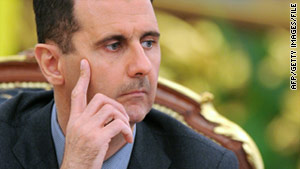 President Bashar al-Assad ended Syria’s state of emergency, in effect for nearly 50 years, on Thursday in a bid to defuse pro-democracy protests against his authoritarian rule that have gripped the country for over a month.
President Bashar al-Assad ended Syria’s state of emergency, in effect for nearly 50 years, on Thursday in a bid to defuse pro-democracy protests against his authoritarian rule that have gripped the country for over a month.
His announcement, ratifying a law passed by the government earlier this week, preceded what activists described as “Great Friday” protests in several Syrian cities when more people are expected to take to the streets after Muslim Friday prayers.
Thousands of Syrians, inspired by uprisings sweeping the Arab world, have demonstrated to demand greater freedom in their tightly controlled country, presenting Assad with the most alarming challenge to his 11-year rule.
The lifting of emergency rule, in force since Assad’s Baath Party took power in 1963 and used to justify arbitrary arrests and detention and a ban on all opposition, is symbolic since other laws still give the pervasive security forces wide powers.
Leading opposition figure Haitham al-Maleh said the move was useless without an independent judiciary and curbs on the powers of the security forces.
Rights activist Ammar Qurabi welcomed the move, a key demand of protesters, but said other measures must follow, such as the release of prisoners detained during the unrest.
State TV said Assad also endorsed legislation that regulates protests and dissolves a state security court which lawyers say violated the rule of law and the right to a fair trial.
“Since he abolished the state security court, we call for a retrial for all those who were convicted by this court. We want them to be retried before a civil court to restore their dignity,” Qurabi told Reuters.
NEXT FLASHPOINT: HOMS
Syrian security forces wielding assault rifles deployed in the flashpoint city of Homs, a witness said, ready for large demonstrations after Friday prayers.
Homs has emerged as the new focal point of protests in mostly Sunni Muslim Syria, where demonstrators have filled the streets to demand greater freedom. Assad’s security apparatus, dominated by minority Alawites, has used gunfire and brutality to cow protesters.
Residents, fearing more attacks by Alawite gunmen known as “al-shabbiha,” have organised themselves into unarmed groups to guard neighborhoods, said the witness, after 21 protesters were shot dead by security police and shabbiha Monday and Tuesday.
“People in Homs are scared and angry,” Wissam Tarif, director of the Insan human rights group, told Reuters.
“Shabbiha and security are obvious in the streets. Kalashnikovs and other weapons are in their hands. Al Saha al Jadida square is packed with security forces. Security is mixed between civilian and uniformed,” he said.
Demonstrations in Syria first erupted in the south last month. Homs, a strategic city 165 km (100 miles) off a main highway north of Damascus, is the latest trouble spot.
The protests, the most serious since an armed revolt by Islamists in 1982, have included ordinary Syrians, secularists, leftists, tribals, Islamists and students.
The demands of ordinary Syrians go beyond democratic freedoms to a better quality of life. Twelve percent of Syria’s 20 million people live below the poverty line and the gap between rich and poor has widened in recent years.
Many protesters have also voiced anger about corruption in the ruling hierarchy.
Assad has tried to defuse popular hostility by reaching out to conservative Muslims and giving citizenship to many ethnic minority Kurds who complain of discrimination.
Rights groups say more than 200 people have been killed since protests started.
IN AND OUT OF ISOLATION
A witness said a small protest broke out Thursday in the northeastern region of al-Hasaka, where many Kurds live.
Syria is involved in several Middle East conflicts. Assad, backed by his family and the security apparatus, is Syria’s absolute ruler and any changes at the top would ripple across the Arab world and affect Syria’s Shi’ite Muslim ally Iran.
The leadership backs the Palestinian Islamist movement Hamas and Lebanon’s Hezbollah but wants peace with Israel.
Assad was isolated by the West after the 2005 assassination of Rafik al-Hariri, the Lebanese former prime minister and businessman, but relations had been improving until Syrian security forces began using force to try to crush protesters.
Authorities have described the unrest as an insurrection by Salafist groups trying to terrorise the population. They have blamed the violence on armed groups and infiltrators supplied with weapons from Lebanon and Iraq. Reuters

Leave a Reply
You must be logged in to post a comment.